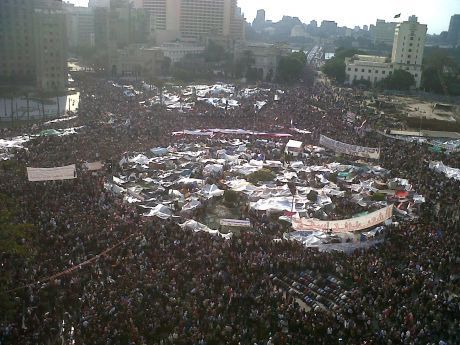Features
You are here
The Egyptian Revolution | 10 years later | must reads and anniversary events

January 25, 2021
Ten years ago, on January 25, 2011, there was a call for demonstrations in Egypt to protest police brutality and the murder of Khaled Mohamed Saeedby secret police. What was expected to be a demonstration of a few hundred against the state sponsored "police holiday" became a mass mobilization against the hated dictator Hosni Mubarak.
Even the most seasoned local activists were surprised at the size and militancy of the demonstrations. The Tunisian uprisings had recently overthrown the dictatorship of Zine El Abidine Ben Ali and the Egyptian protests were infused with the spirit of revolution.
As Egyptian revolutionary socialist Sameh Naguib wrote, "The demonstrations started with the usual slogans against police attacks... but as soon as the now famous Tunisian chant was shouted - "The people demand the fall of the regime" - something seemed to have changed, both in the mood of the activists and the rapidly increasing numbers of people joining the protest marches."
Millions streamed into the streets of Egypt and held out against brutal repression. Thousands of riot police were organized but they were overwhelmed. On that first day, Naguib states, "Tens of thousands of demonstrators were able to break through the barriers and reach the city centres, including of course Tahrir Square. But the battles continued. There were tens of martyrs and thousands injured at the end of that day of liberation, the day that ignited the Egyptian revolution."
The protests were attacked by by various levels of the Egyptian police state but they stood firm. For more than two weeks, protestors held the squares and built support in the workplaces.
The protests at Tahrir Square became a carnival of the oppressed. Unity against the oppressive state challenged old ideas. Historic divisions were dissolved when Christians linked armsto protect praying Muslims and when women took prominent leadership roles. The "muck of the ages", as it was called by Marx, was swept away.
But Mubarak wouldn't leave easily. It took a growing movement on the streets and in the workplaces to boot him out. On February 11, the largest demonstrations came with 15 million people filling the streets across the country while workers walked out and strikes spread. Mubarak was finished. That night saw, "mass celebrations that continued through the night and the whole of the next day and were the largest and most festive in Egypt's modern history."
The Egyptian revolution and the larger Arab Spring demonstrations were an inspiration to millions around the world and showed that masses of people can, in fact, bring about revolutionary change.
Imperialists and local capitalists have since fought to take away the gains of the revolution and bring about a new dictatorship. But the Egyptian people showed us through the uprising that masses can force change. There are lessons from the struggle of the Arab Spring that must be learned by all who seek a revolutionary transformation.
We offer here a list of readings from those days and analysis of the subsequent counter revolution. Read on for inspiration and to learn the lessons for today.
The Egyptian Revolution—18 days that shook the world

Workers at the Misr Insurance Company on strike in Cairo during the revolution. 'We want change' was their slogan (Pic: Socialist Worker)
A revolution in Egypt in 2011 overthrew a brutal dictator and gave a glimpse of how society could be run differently. Egyptian revolutionary Hossam el‑Hamalawy tells the story of the revolt and looks at the lessons it holds for struggle today. Read about it here.
Egypt in revolt - Judith Orr's Cairo diary

Socialist Worker editor Judith Orr reported from Cairo as the revolution unfolded. Read her reports here.
The Egyptian Revolution—what role did the army play?

Ten years ago this week protests erupted in Egypt and troops were deployed on the streets. Nick Clark looks at the role of the army in the early days of the revolution. Read his analysis here.
Workers and the revolution
The Egyptian revolution was preceded by a new workers militancy.
Anne Alexander describes the development of the Egyptian workers movement in the years before the uprising.
Inside Egypt’s mass strikes
Philip Marfleet revisits the workers role during the revoltion itself
The revolution 10 years on
Neoliberalism, the state and revolution: the case of Egypt
The Egyptian Revolution that began in January 2011 was the most important breakthrough for the Arab working class in over 50 years. It was a blow against capitalism in its neoliberal mode and an inspiration to activists worldwide. Philip Marfleet analyses what is happening to the Egyptian state now. Read about it here.
Live: 10 years on - why the Arab Spring still matters
Tuesday, Feb 2, 2021 AT 2 PM EST
SWP TV live event with:
• Hossam El-Hamalawy, journalist and member of the Egyptian Revolutionary socialists
• Anne Alexander, author of forthcoming "Revolution is the choice of the people - Middle East and North Africa's rebellious decade"
• Muzan Alneel, Sudanese activist
A wave of revolutions and uprisings - wrongly referred to as the 'Arab Spring' - swept the Middle East in 2011. From Tunisia to Libya, Egypt, Syria and Yemen dictators who had ruled for decades tottered in the face of huge protests. Mass strikes played a crucial role in the victory of the first two uprisings in Tunisia and Egypt following years of rising working class anger and militancy. Even the Gulf was not immune as popular uprising convulsed Bahrain and protests spread into neighbouring Saudi Arabia's Eastern Province among the kingdom's oppressed Shia minority.
Democratic rights and social justice were the main demands of the mass movements, but in many countries they also challenged racism, sectarianism and sexism, mobilising millions of people as agents of their own liberation.
Despite the horrors of counter-revolution and war which followed, a new round of uprisings began in Sudan, where dictator Omar el Bashir was toppled by a popular movement in April 2019.
Understanding what are the conditions which lead to revolutions, when they succeed and why they fail is a crucial task for anyone who wants to change the world. In this special meeting to mark the tenth anniversary of the 2011 uprisings, we will be joined by Egyptian revolutionary activist Hossam el-Hamalawy, author Anne Alexander and Sudanese activist Muzn al-Nil to discuss why the 2011 uprisings matter to socialists today.
Section:










